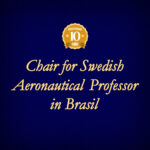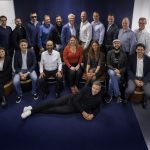The Federal University of Santa Maria (UFSM) has maintained constant relations with Swedish educational institutions, which has resulted in exchange programs that allow Brazilian students to expand their scientific knowledge.

“The exchange programs with Sweden are an excellent opportunity for students to continue their learning process”. The sentence is by Nattan Caetano, professor in the Aerospace Engineering course and member of the University of Santa Maria’s (UFSM) interaction committee with Sweden. He says that, as a university located in the countryside of Rio Grande do Sul, the institution has come up against some limitations regarding technical equipment. In this context, the students’ journey to the Scandinavian country has been a kind of escape for those who wish to take a step further in their research. “Here, work is focused on theory. In Sweden, the student has modern laboratories available where he can carry out experiments and complete his scientific articles,” he explains.
The steady flow of students going to Europe has brought many benefits. More than deepening researches, students can broaden their network of relationships with people from other countries. It is a golden opportunity for the international community to know what is being done in Brazil. “This action opens doors so that we can seek new funding channels for research not only with the Swedes, but with Europeans as a whole,” explains the professor.
Caetano’s own academic history is closely linked to a trip to the Scandinavian country. In 2016, he attended the Aerospace Technology Congress, held in Stockholm. There he met Professor Konstantinos Kyprianidis, from Mälardalen University (MDH). The talks evolved until a joint academic paper was developed in the combustion area, focused on the aerospace segment, which is about to be published in the ThermoScience Engineering Process by the renowned publisher Elsevier. “Only a few adjustments were requested,” says the professor.
A year later, Caetano participated in the Immersion programme in Sweden organized by MEI in partnership with CISB. The professor took the opportunity to hold a new meeting with Kyprianidis, which further strengthened the relationship between the two institutions, stimulating the flow of new students.
The approach with the Swedes also brought a real revolution to the entire UFSM engineering teaching system. This is the implementation of the CDIO methodology, a set of best practices created in a joint effort between MIT and three Swedish universities: Royal Institute of Technology (KTH), Chalmers University of Technology (CTH) and Linköping University (LiU). The novelty aims to make the student face real situations they may encounter in the working environment. “The student is encouraged to put the theoretical project developed in the classroom into practice. It is a very big change to the regular system of teaching, with books, blackboards and chalk. Now, the student goes through the complete cycle of an engineer’s life inside the university,” says Caetano.




